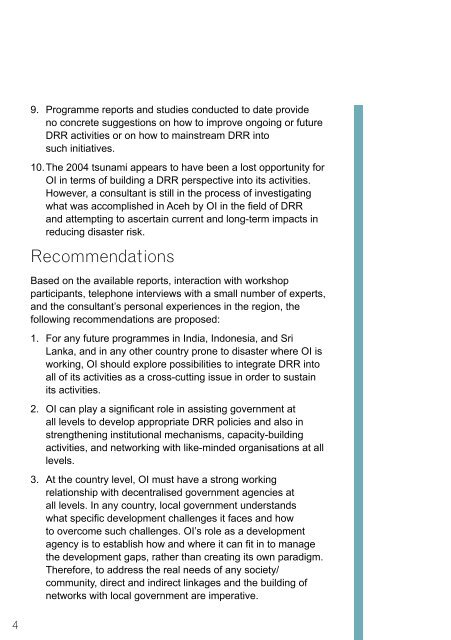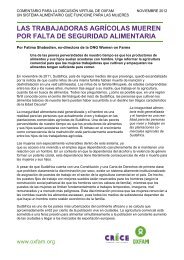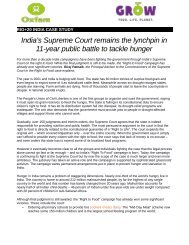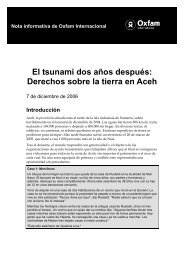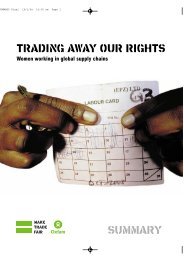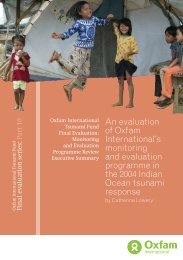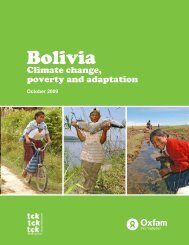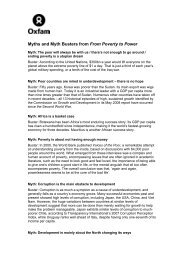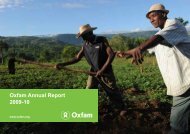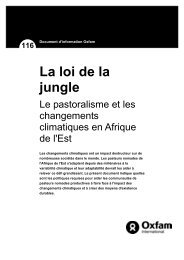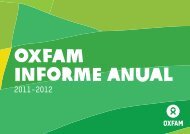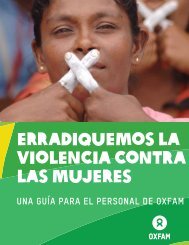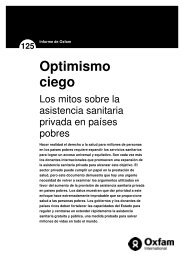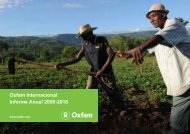Evaluation of disaster risk reduction - Oxfam International
Evaluation of disaster risk reduction - Oxfam International
Evaluation of disaster risk reduction - Oxfam International
Create successful ePaper yourself
Turn your PDF publications into a flip-book with our unique Google optimized e-Paper software.
9. Programme reports and studies conducted to date provide<br />
no concrete suggestions on how to improve ongoing or future<br />
DRR activities or on how to mainstream DRR into<br />
such initiatives.<br />
10. The 2004 tsunami appears to have been a lost opportunity for<br />
OI in terms <strong>of</strong> building a DRR perspective into its activities.<br />
However, a consultant is still in the process <strong>of</strong> investigating<br />
what was accomplished in Aceh by OI in the field <strong>of</strong> DRR<br />
and attempting to ascertain current and long-term impacts in<br />
reducing <strong>disaster</strong> <strong>risk</strong>.<br />
Recommendations<br />
Based on the available reports, interaction with workshop<br />
participants, telephone interviews with a small number <strong>of</strong> experts,<br />
and the consultant’s personal experiences in the region, the<br />
following recommendations are proposed:<br />
1. For any future programmes in India, Indonesia, and Sri<br />
Lanka, and in any other country prone to <strong>disaster</strong> where OI is<br />
working, OI should explore possibilities to integrate DRR into<br />
all <strong>of</strong> its activities as a cross-cutting issue in order to sustain<br />
its activities.<br />
2. OI can play a significant role in assisting government at<br />
all levels to develop appropriate DRR policies and also in<br />
strengthening institutional mechanisms, capacity-building<br />
activities, and networking with like-minded organisations at all<br />
levels.<br />
3. At the country level, OI must have a strong working<br />
relationship with decentralised government agencies at<br />
all levels. In any country, local government understands<br />
what specific development challenges it faces and how<br />
to overcome such challenges. OI’s role as a development<br />
agency is to establish how and where it can fit in to manage<br />
the development gaps, rather than creating its own paradigm.<br />
Therefore, to address the real needs <strong>of</strong> any society/<br />
community, direct and indirect linkages and the building <strong>of</strong><br />
networks with local government are imperative.<br />
4. Future DRR initiatives must have significant visibility. Many<br />
DRR activities initiated by OI in its tsunami response were not<br />
visible. Similarly, OI should explore more avenues in terms <strong>of</strong><br />
working with local communities, authorities at local/community<br />
level, and administrative or government authorities at other<br />
levels, so that the activities it initiates will have visibility and<br />
can be sustained in the long term. Similarly, support for the<br />
development <strong>of</strong> policy, guidelines, and strengthening <strong>of</strong><br />
institutional mechanisms should be more visible, compared<br />
with capacity-building activities.<br />
5. OI should continue to support functional groups formed<br />
to link with government authorities at local and provincial/<br />
district levels for different activities. In developing countries,<br />
such groups can play a significant role in mobilising local<br />
communities, including community participation, linkages<br />
between communities and (I)NGOs, utilising local resources,<br />
monitoring community activities, etc.<br />
4 5


